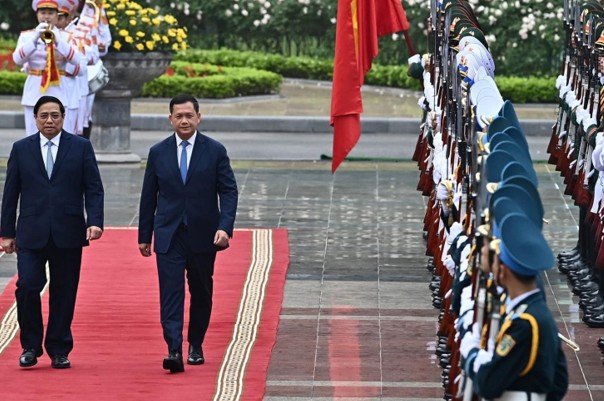Cambodia’s recent foreign policy moves, including its withdrawal from the Cambodia-Laos-Vietnam Development Triangle Area (CLV-DTA) and its push for the Funan Techo Canal, have been interpreted by some as signs that the country is shifting away from Vietnam’s influence. A recent article in The Diplomat suggested that Cambodia’s policy shift under Prime Minister Hun Manet signals an intentional distancing from Hanoi.
However, economic data, diplomatic engagements, and historical ties tell a more nuanced story. Cambodia is not turning its back on Vietnam but is strategically diversifying its foreign relations to assert greater autonomy while maintaining strong ties with its long-time neighbor.
Economic Partnership Continues to Grow
While some analysts claim Cambodia is stepping away from Vietnam’s economic influence, trade data suggests otherwise. Bilateral trade between the two nations reached $6.4 billion in the first ten months of 2024, a 20% increase compared to the previous year. Cambodia’s exports to Vietnam surged 31%, further solidifying their economic interdependence.

These figures reflect a long-term trend. In 1998, Cambodia-Vietnam trade stood at just $117 million. By 2010, it had soared to $1.8 billion. Today, Vietnam is Cambodia’s third-largest trading partner, after China and Thailand, underscoring the resilience of their commercial ties.

The Diplomat article claims that Cambodia is seeking to reduce its reliance on Vietnam’s ports by developing the Funan Techo Canal. While this may be true, it does not mean Cambodia is disengaging from Vietnam altogether. The project is about economic efficiency, not political realignment. Vietnamese officials have acknowledged the canal’s significance and expressed a willingness to cooperate on its environmental impact. Hanoi’s engagement demonstrates that the project is not a sign of severed ties but rather part of Cambodia’s broader economic modernization.
Diplomatic Engagements Remain Strong
Despite speculation about political rifts, diplomatic exchanges between Cambodia and Vietnam have remained active. Prime Minister Hun Manet and Vietnamese Prime Minister Pham Minh Chinh have met multiple times in 2024, reaffirming commitments to cross-border trade, infrastructure projects, and security cooperation.
Former Cambodian Prime Minister Hun Sen, who continues to hold significant political influence, recently called for “further solidifying Cambodia-Vietnam relations”, emphasizing collaboration in defense, tourism, and energy. Such statements contradict claims that Cambodia is moving away from Vietnam.
Additionally, Vietnam has played a crucial role in Cambodia’s growing energy sector. Cambodia is set to increase its power import capacity by 50% over the next two years, and Vietnam remains one of its primary energy suppliers.

Infrastructure collaborations such as the Cambodia-Vietnam Border Gate Economic Zone Agreement, which facilitates trade and labor movement, further cement their close ties.
Historical Bonds and Political Realities
One of the central claims in The Diplomat’s article is that Cambodia’s younger leadership, under Hun Manet, lacks the historical bonds with Vietnam that defined the previous generation, making it easier for Phnom Penh to step away from Hanoi’s influence.
While it is true that Hun Manet represents a new generation of leadership, this does not equate to a strategic detachment from Vietnam. Cambodia and Vietnam share deep historical ties, dating back to Vietnam’s role in overthrowing the Khmer Rouge in 1979. Hun Sen himself has consistently recognized Vietnam’s role in stabilizing Cambodia, acknowledging that without Hanoi’s intervention, Cambodia “would absolutely not be where it is today.”
Furthermore, the Cambodian People’s Party (CPP) has maintained close ties with Vietnam’s Communist Party for decades. While the new government may emphasize a more independent foreign policy, it does not mean an abandonment of these long-standing relationships. Instead, Phnom Penh is expanding its diplomatic reach while maintaining core alliances.
Diversification, Not Detachment
Cambodia’s foreign policy under Hun Manet is not about moving away from Vietnam but about reducing dependency on any single country, including China and Western powers.

In addition to Vietnam, Cambodia has actively strengthened ties with:
- Japan: In 2023, Phnom Penh elevated its relationship with Tokyo to a Comprehensive Strategic Partnership, a status Japan reserves for key allies.
- South Korea: In 2024, Cambodia upgraded its ties with Seoul to a Strategic Partnership, deepening economic and security cooperation.
- The West: Cambodia has aligned itself with Ukraine following Russia’s invasion, a move praised by European leaders.
This shift should not be mistaken for a pivot away from Vietnam but rather as part of a broader strategy of diversification, allowing Cambodia to engage with multiple economic and political partners without being overly reliant on any single one.
Strategic Autonomy, Not a Break from Vietnam
The idea that Cambodia is distancing itself from Vietnam oversimplifies a complex geopolitical reality. While the government under Hun Manet is seeking greater independence and reducing overreliance on Vietnam’s infrastructure, economic data, trade agreements, and ongoing diplomatic exchanges all point to continued cooperation between the two nations.
Rather than stepping away from Vietnam, Cambodia is positioning itself as a more autonomous and diversified player on the regional and global stage. The key takeaway is not detachment, but strategic recalibration—a move that ultimately strengthens Cambodia’s position rather than weakening its historical alliances.


